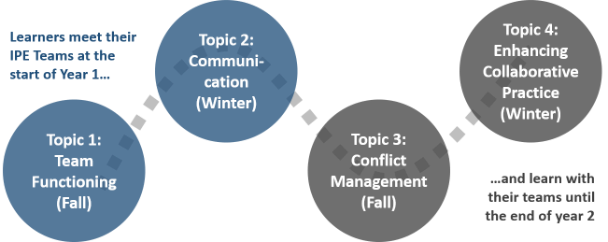IPE Skills Training Series
The IPE Skills Training Series is a 2-year experiential and relfective learning program that focuses on collaborative processes and their impact on interprofessional team-based health and social care. The series,
- Will be offered with a blend of online and in-person meetings in 2023/24
- Consists of a series of eight 3-hour sessions offered over four semesters (Learners complete 2 sessions per semester),
- Covers four interprofessional collaboration topics (expanded on below),
- Utilizes reflections and interactive, case- and simulation-based learning activities designed to enhance student skills in collaboration, interprofessional communication and conflict management,Integrates themes of patient safety, cultural sensitivity, vulnerable patient populations, stigmatization, and personal values and biases across the four topics,
- Organizes learners into the same small interprofessional teams over the two years, allowing students to create and learn from meaningful interprofessional relationships,
- Pairs interprofessional learner teams with a faculty member, clinical practitioner or advanced learner who facilitates discussion and shares real-world experiences with their team, and
- Includes pre-licensure learners from the feilds of medicine, nursing, pharmacy, social work, psychology, and human kinetics and recreation.
The IPE Skills Training Series Model

Topic #1. Team Functioning (Fall, Year 1)
2023/24 dates:
Session 1: Friday, September 22nd, 2023; 1:00 to 4:00pm IN-PERSON
Session 2: Friday, November 3rd, 2023; 1:00 to 4:00pm IN-PERSON
Topic #1 provides learners with a greater understanding of the dynamics of team functioning and the roles of professionals who collaborate for safe, culturally sensitive, and effective patient care. Learners will also analyze their own role and contributions as a team member, and will develop and present a case study presentation demonstrating their understanding of professional and team roles to their peers in Session 2.
Topic #2. Communication (Winter, Year 1)
2023/24 dates:
Session 1: Friday, January 19th, 2024; 1:00 to 4:00pm ONLINE
Session 2: Friday, February 2nd, 2024; 1:00 to 4:00pm IN-PERSON
Communication among health/social care professionals is an important function in the provision of safe health care. In Topic 2 learners discuss principles underlying effective communication, including attitudes of respect, upholding others' dignity, power equity, inclusivity, and social justice principles. As well, learners will identify factors that impact the communication process; i.e. personal values, biases, professional limitations, and verbal and non-verbal communication blockers. Topic 2 cumlinates with a formative team simulation exercise with a standardized health professional.
Topic #3. Conflict Management (Fall, Year 2)
2023/24 dates:
Session 1: Friday, September 29th, 2024, 1:00 to 4:00pm ONLINE
Session 2: Friday, October 20th, 2024, 1:00 to 4:00pm IN-PERSON
Topic #3 discusses interprofessional conflict as an inevitable part of working collaboratively. Developing effective conflict management skills is critical for all health/social care professionals to facilitate safe, high quality patient care. This training will explore the underlying sources of conflict (role boundary issues, scope of practice, leadership, impact of power differentials, accountability, and patient related issues), barriers to managing conflict, and strategies for preventing and resolving conflict.
Topic #4. Enhancing Collaborative Practice (Winter, Year 2)
2023/24 dates:
Session 1: Friday, February 9th, 2024; 1:00 to 4:00pm ONLINE
Session 2: Friday, March 1st, 2024; 1:00 to 4:00pm IN-PERSON
Learners will more fully explore the challenges for implementation of effective teamwork in practice settings in the final Series topic. Highly effective collaboration requires the support and commitment of individual professionals, the health/social care team and health/social system managers. Health and social care professionals are challenged to balance individual professional standards, team goals, and the desired outcomes for patients and families to optimize team functioning and provide safe, high quality care. Topic 4 also revisits the simulation format introduced in Topic 2 (Communication) with more complexity and allows teams to demonstate their mastery of the collaborative skills they have developed together across the Series.